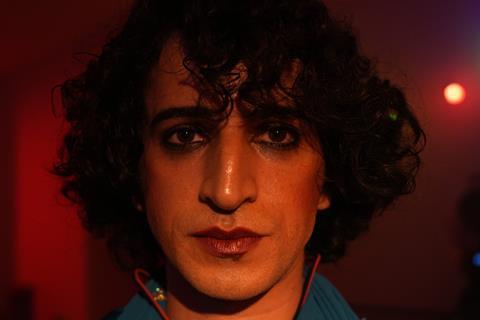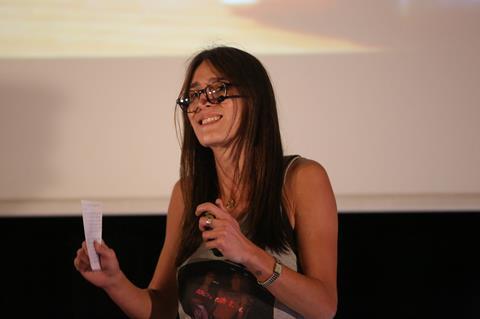
Afghanistan set Cinema Jazireh tells the story of Leyla (Fereshte Hosseini) who – after the Taliban massacre her family – tries to find her missing son Omid. On her journey she encounters Zubar (Mazlum Sümer) and Amad (Ali Karimi Waheed) working in a mysterious place in which men dress as women and whose own predicaments soon push her to her emotional limits.
It is the sophomore feature for Turkish filmmaker Gözde Kural who won several awards for her 2015 debut feature Dust.
Cinema Jazireh is produced by Kural’s Toz Film Production, Tehran-based Seven Springs Pictures, whose previous productions include 2023 Un Certain Regard contender Terrestrial Verses, Turkey’s KoskosFilm, Romania’s Avva Films and Bulgaria’s Front Film. It world premeries in the Crystal Globe competition at Karlovy Vary International Film Festival.
The film mentions that it’s based on true stories. How did those stories come to you?

I started working in the film industry at the age of 20, right after graduating, but it wasn’t enough for me; I felt a deep need to understand the world. That urge led me to Afghanistan. I spent a lot of time there, travelled through many cities, met countless people, and read extensively about the country. Eventually, I shot my first feature, Dust (Toz), in Kabul.
After returning home, I realised I had gathered so many untold stories, and at the same time, things were rapidly changing in my own country and region, with a growing wave of radicalisation moving backward.
It was during my time in Afghanistan, observing practices like Bacha Bazi (the exploitation of boys for dance and sexual entertainment) and Bacha Posh (where families disguise a girl as a boy to gain social advantages or overcome the stigma of not having sons), that the initial idea for Cinema Jazireh struck me.
Can you tell us more about the practical journey to gather the funding for the film?
In countries like ours, where currency fluctuations are rapid and the economy is unstable, bringing a film to the production stage is a major challenge. But Cinema Jazireh was especially, both due to its subject matter and the geography it deals with. Every partner had to be convinced one by one.
I began by participating in pitching platforms to make the film more visible step by step. Later, we continued the journey with new co-producers who came on board. Even after the contributions from Bulgaria, Romania and Iran, there was still a significant financial gap. With our producer Bulut Reyhanoğlu, we managed to close that gap thanks to a few angel investors from Turkey who genuinely believe in auteur cinema. To give just one example of the financial challenges we faced: after reviewing the film, due to certain policy considerations, our Ministry of Culture decided to withdraw its support and even requested the return of the previously granted funds. This decision created an additional financial burden for us at a very sensitive stage of the production.
How important was it to you to find a balance between the film focusing on the specifics of the situation Afghanistan faces whilst also having more universal resonances?
There’s a piece of wisdom I once heard that stayed with me while building the structure of the film: “What we tell is only ever understood as much as the other side is able to comprehend.” That became a kind of guide for me. The goal was never to deliver slogans or force didactic messages; at least, I don’t believe that’s what cinema should do. So, striking a balance between the specific and the universal was extremely important to me.
How did you cast the leads of Fereshte Hosseini, Mazlum Sümer, and Ali Karimi?
Zabur is arguably the film’s most complex character, and for a long time, I couldn’t quite picture the right actor for him. One day, a writer friend insisted I meet Mazlum Sümer. The moment I saw him, I was struck by the energy in his eyes. He had barely appeared in any films before, and he was from Turkey and didn’t speak Farsi either. But after a few meetings, I felt he was worth the risk. Watching the finished film now, I realise just how big of a risk we took, and how fully he rose to the challenge.
Fereshte Hosseini was an actress I already knew. When casting a woman who would disguise herself as a man, her facial structure was also important. It was our producer Milad Khosravi who first suggested Fereshte, and honestly, I didn’t hesitate. She was perfect for the role, not just physically, but also emotionally and politically. Being an Afghan-born Iranian, she fully understood the layered identity and the stakes at hand.
Ali Karimi’s casting was a different story. I had worked with child actors before, but given the nature of this character, we had to be especially careful. I watched many auditions, and the moment I saw Ali, his presence, his eyes, and his intuitive grasp in front of the camera really moved me.
What projects are you planning to do next?
After two feature films about Afghanistan, it’s time to return home. Currently, I’m working on a project that’s very close to me, which explores the tensions between rising nationalism, social pressures, and individual freedom within an urban Turkish setting. The film focuses on how public symbols and collective identities can intrude upon private lives, creating a complex mix of conflict, irony, and dark humour.















![[L-R]: Amanda Villavieja, Laia Casanovas, Yasmina Praderas](https://d1nslcd7m2225b.cloudfront.net/Pictures/274x183/6/4/1/1471641_pxl_20251224_103354743_618426_crop.jpg)








![[L-R]: Amanda Villavieja, Laia Casanovas, Yasmina Praderas](https://d1nslcd7m2225b.cloudfront.net/Pictures/100x67/6/4/1/1471641_pxl_20251224_103354743_618426_crop.jpg)
No comments yet